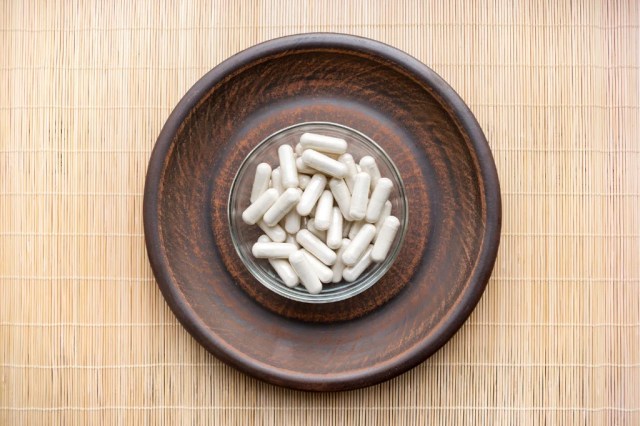
Throughout the long and winding history of Ayurvedic medicine, Ashwagandha (Withania somnifera) has held a prominent role as a Rasāyana – the Sanskrit word for “path of essence.” Rasāyana is an early medical term for methods that expand one’s lifespan and invigorate both mind and body.
Ashwagandha belongs to the subgroup of Rasāyana called Medhyarasayanas, “medhya” referring to the mind and intellect. Indeed, nearly every part of the Ashwagandha herb has been used since at least 6000 BC to promote a youthful state of mental health and increase mental (as well as physical) wellbeing. It was, perhaps, the original ‘mother’s little helper.’
Ashwagandha: Traditional Medicine for the Mind
The History & Etymology of Ashwagandha
Ashwagandha’s medicinal properties are neatly packed into the herb’s own etymology. The Latin smonifera translates to ‘sleep inducing’, while the Ayurvedic name stems from the union of ‘ashva’, meaning horse, and ’gandha’, meaning smell. This not only refers to the horsey smell of the plant but its ability to give one the strength and vitality of that noble animal.
Ashwagandha’s root was traditionally employed as a narcotic, a stimulant, a treatment for rheumatism, insomnia, and even nervous breakdowns. Turned into a paste, it was an antidote to snake venom and scorpion stings. Its bitter leaves, a treatment for fever. Its flowers, an aphrodisiac. In liquid form, with various other ingredients, a tonic for hysteria, anxiety, and memory loss.
Ashwagandha Under the Clinical Lens
In recent years, Ashwagandha has undergone extensive clinical study to pinpoint whether it does in fact exert anti-stress agents. Numerous studies have found the herb to increase stamina and guard against stress-induced damage such as gastric ulcers or hepatotoxicity.
Animal studies have provided considerable proof of Ashwagndha’s anti-stress and antidepressant properties. One study found the calming effect of the herb comparable to the drug Lorazepam, elevating social interaction and feeding latency in a new environment.
A separate trial on participants with chronic stress found a large reduction in all stress-assessment scales for the Ashwagandha group, including a significant reduction in cortisol levels, and improvement in self-assessed quality of life.
How Ashwagandha Reduces Stress & Anxiety
Most Rasāyana, including Ashwagandha, are adaptogens, meaning plants that enhance the body’s own natural resistance to stress and sensitivity to stressors. Many adaptogens appear to exhibit properties that are neuroprotective, anti-fatigue, antidepressant, anxiolytic (anti-anxiety), and nootropic (enhancing memory and cognitive functions). Many also contain properties that stimulate the central nervous system (CNS).
When considering the anti-anxiolytic properties of Ashwagandha, it helps to have a vague understanding of Gamma-aminobutyric acid (GABA) and its role in the body. This is because Ashwagandha is believed to exert GABA mimetic properties, meaning the herb mimics or imitates the activities of GABA.
GABA is the neurotransmitter primarily responsible for inhibiting the central nervous system. Meaning it quite literally blocks certain brain signals, including those related to stress, fear, and anxiety. It’s the chemical that allows your body and mind to relax before falling asleep, insomnia often being a symptom of low GABA activity.
Another sign of low GABA activity is long-term anxiety. In fact, many psychiatric conditions have been linked or attributed to low GABA levels, especially generalized anxiety disorder (GAD). With anxiety at the forefront of the current mental health crisis and a demand for more natural solutions, clinical studies have focused on Ashwagandha as an alternative treatment for anxiety.
Recommended Daily Dose for Anxiety
According to several clinical trials:
- A daily dose of 125 mg – 5 grams of Ashwagandha for 1–3 months may lower cortisol levels by 11–32%.
- A daily dose of 500-600 mg of Ashwagandha for 6-12 weeks may reduce anxiety and insomnia in those with stress or anxiety disorders.
How long does it take for Ashwagandha to start working?
A human trial on GAD patients found significant improvements after 2 months of taking Ashwagandha, with participants reporting better moods, less tension, and less anxiety.
It can take roughly 2 weeks to feel the effects of Ashwagandha, although some may not feel the effects until 6-12 weeks.
A Natural Way to Restore Balance to the Body
The evidence so far suggests that Ashwagandha is a valid supplement for anxiety, stress, mood swings, and perhaps more restful and undisturbed sleep. As a prominent adaptogen, Ashwagandha helps the body adjust to and protect itself from physical and biochemical stress, allowing it to regain “homeostasis”, or, in other words, restore balance to the entire system.





